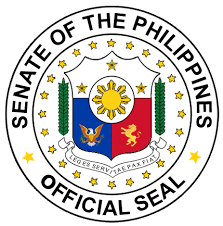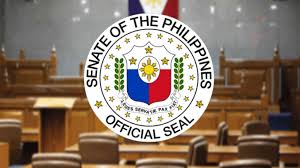HEADLINE | MANILA- Maharlika fund worries senators
Philippine Senate
.
.
.
SOME senators harbor concerns over the proposed creation of the P275-billion Maharlika Wealth Fund (MWF) because it intends to tap private and public pension contributions.
Under the bill jointly filed by House Speaker Martin Romualdez and Rep. Ferdinand “Sandro” Marcos 3rd, the fund will pool resources from the Government Service Insurance System (GSIS), Social Security System (SSS), LandBank and Development Bank of the Philippines for investments.
Senate Majority Leader Emmanuel “Joel” Villanueva, Senate Minority Leader Aquilino “Koko” Pimentel 3rd, as well as Senators Juan Edgardo “Sonny” Angara, Joseph Victor “JV” Ejercito, Francis Joseph “Chiz” Escudero and Christopher “Bong” Go wanted safeguards to prevent the government from dipping into pension funds and invest the amount elsewhere without the consent of SSS and GSIS members.
Pimentel stressed that there must be “consultation and consent of the owners of the funds they intend to put in higher risk placements.”
Angara noted that because the Maharlika fund is “a high-risk high reward endeavor, there should be safeguards and limitations on investment into riskier endeavors.”
“I’m sure senators will scrutinize the measure and inject safeguards and best practices,” he said in a text message.
Angara said that accessing pension funds is a ticklish issue and could “encounter some obstacles.”
It is “best to access investible funds and use dormant government assets, or those with high potential upsides like real properties abroad, as part of the equity of the fund,” he added.
Ejercito said he is “apprehensive to touch pension funds because of past experience with AFPSLAI (Armed Forces and Police Savings and Loan Association), AMSLAI (Air Materiel Wing Savings and Loan Association, Inc.) and RSBS ([AFP] Retirement and Separation Benefits System) which ventured into bad investments.”
“The intent of Maharlika bill seems good, except that I am wary to use GSIS and SSS funds for this purpose,” Ejercito said.
Escudero said the Maharlika fund bill “is lacking in many respects.
“What is return on investment of GFIs (government financial institutions)? How often will dividends be declared, if any?” he asked.
“If it’s a corporation, why is the number of board seats not in accordance with their respective capital contributions? What ROI (return on investment) will GFIs get if it will be spent on government projects? What government projects are they contemplating?” he pressed.
Villanueva said while creating a sovereign wealth fund or SWF is good in principle, “there should be more discussions on its sources of funds and its management.”
“We must protect the retirement funds and other benefits of ordinary workers, who are already struggling from high prices of basic goods and are bracing for the impending global recession,” he said.
“We look forward to hearing more views from different stakeholders when we discuss this proposal in the Senate,” Villanueva said.
Speaking during the Development Budget Coordination Committee (DBCC) on Monday, Finance Secretary Benjamin Diokno defended the measure.
“I think we should have a sovereign wealth fund like other Asean countries like Singapore, Indonesia, Malaysia and Vietnam. And we should think of putting together some funds that are investable,” Diokno said.
He said the fund “will not only benefit current generation of the Philippines but also future generations. That’s the concept of this Maharlika.”
Diokno said the Philippines needs a “steady source” of revenues, particularly in the sectors of oil, mining, and banking. “We just opened our mining. We can use the royalty from there. Our mining sector is huge. It is substantial,” he said.
Under House Bill (HB) 6398 approved by the House Committee on Bank and Financial Intermediaries on Thursday, P125 billion of the Maharlika fund will be sourced from the GSIS, P50 billion each from the SSS and Land Bank, and P25 billion each from the DBP and the Philippine Treasury.
Jose Arnulfo “Wick” Veloso, GSIS president and general manager, said tapping GSIS pension funds is “nothing outside of what we’re doing.”
“Currently, all of the excesses after expenditures, [and] allocation for the retirement benefits of our members and other obligations are invested. So now we invest into a company that will now be able to train their guns and attention to developmental projects… and that is what we need,” Veloso said.
He said countries like the Philippines “have huge amounts of industrial requirements that are high capital expenditure… and that is the reason why a number of our key industries can’t really move forward, because you need a lot of capital. But we have the money, what we need is to collect these funds… so that these money will be allocated to high capital expenditure businesses.”
Opposed
Multisectoral organizations, however, strongly opposed the establishment of an SWF like the proposed Maharlika.
Among the groups are the Foundation For Economic Freedom, Competitive Currency Forum, Filipina CEO Circle, Financial Executives Institute of The Philippines, Institute of Corporate Directors, Integrity Initiative, Inc., Makati Business Club, Management Association of the Philippines, Movement for Good Governance, Philippine Women’s Economic Network, UP School of Economics Alumni Association, and Women’s Business Council Philippines, Inc.
“We register our serious concerns and reservations against the proposed MWF on the principles of fiscal prudence, additionality, solvency of social pension funds, contingent liabilities, monetary independence of the Bangko Sentral ng Pilipinas (BSP), government in the economy, and transparency,” they said in a joint statement.
They pointed out that commodity-based SWFs are designed “to optimally manage the windfall from the appropriate disposition of their natural resources for the benefit of future generations.”
“These countries recognize that such natural resources are exhaustible and commodity prices are uncertain in the long run, while their current absorptive capacity for commodity earnings remains limited,” they said.
Non-commodity-based SWFs, on the other hand, are designed to manage the accumulated foreign assets from persistent external trade surpluses and surpluses of state-owned enterprises (SOEs) in order to preserve the value of their capital and realize long-term returns on investments.
The Philippines “has neither commodity-based surpluses nor surpluses from external trade and SOEs,” they said.
The groups suggested instead “that the executive and legislative branches continue to implement existing initiatives to strengthen the areas of transportation, public health, education and infrastructure, especially digital and agriculture, that can boost productivity and lower inflation. These initiatives can be executed within the existing legal framework, without resorting to an untested approach with many potential infirmities.”
But economist Dr. Michael Batu said at least 50 nations, including those in the Southeast Asian region, have an SWF.
Batu told a televised briefing Monday that if the Maharlika fund measure is approved, the government will have the chance to invest and buy stocks, bonds and real estate.
It will also generate more employment.
Batu said a sovereign wealth fund can also strengthen the government’s pension system which will benefit senior citizens.
He acknowledged that safeguards must be in place to ensure transparency and give taxpayers assurance that every centavo of their money is spent wisely.
Representative Marcos told reporters the corporation proposed in the Maharlika fund bill “will be free from politics.”
“Yes, the President will be chairman of the board, but… you have to look at it beyond this administration. This isn’t something for the next six years, this is something that will keep on going,” Marcos said.
Senior Deputy Speaker Gloria Macapagal Arroyo said in a statement on Monday that the success of any fund, sovereign or private, “lies in the quality of its management.”
“In the current version of the Maharlika Wealth Fund, the President of the Philippines chairs its governing board. This is a powerful statement that the highest official of the land will hold himself as ultimately accountable to the Filipino people for the performance of the Fund,” the former president said.
“Once the fund becomes operational, the President will “be able to count on advice from the Department of Finance, the nation’s steward of sound fiscal policy,” Arroyo said.


 Memento Maxima Digital Marketing @
Memento Maxima Digital Marketing @ Ads by: Memento Maxima Digital Marketing
Ads by: Memento Maxima Digital Marketing






